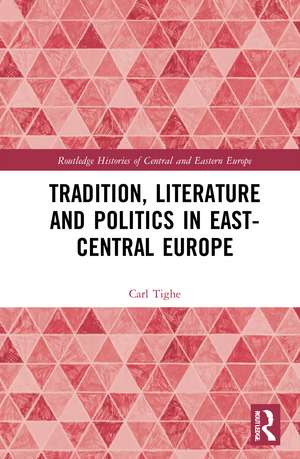Tradition, Literature and Politics in East-Central Europe: Routledge Histories of Central and Eastern Europe
Autor Carl Tigheen Limba Engleză Hardback – 31 dec 2020
Since the countries of East-Central Europe joined the European Union in 2004 the politicians and oppositionists of the centre-left, who once led the charge against communism, have often been forced to give way to right-wing, authoritarian, populist governments. These governments, while keen to accept EU finance, have been determined to present themselves as protecting their traditional ethno-national inheritance, resisting ‘foreign interference’, stemming the ‘gay invasion’, halting ‘Islamic replacement’ and reversing women’s rights. They have blamed Communists, liberals, foreigners, Jews and Gypsies, revised abortion laws, tampered with their constitutions to control the Justice system and taken over the media to an astonishing degree. By 2019, amid calls for the suspension of their voting rights, both Poland and Hungary had been taken to the European Court of Justice and the European Parliament and had begun to explore ways to put conditions on future EU funding.
This book focuses on the interface between tradition, literature and politics in east-central Europe, focusing mainly on Poland but also Hungary and the Czech Republic. It explores literary tradition and the role of writers to ask why these left-liberals, who were once ubiquitous in the struggles with communism, are now marginalised, often reviled and almost entirely absent from political debate. It asks, in what ways the advent of capitalism ‘normalised’ literature and what the consequences might be? It asks whether the rise of chauvinism is ‘normal’ in this part of the world and whether the literary traditions that helped sustain independent political thought through the communist years now, instead of supporting literature, feed nationalist opinion and negative attitudes to the idea of ‘Europe’.
| Toate formatele și edițiile | Preț | Express |
|---|---|---|
| Paperback (1) | 258.89 lei 6-8 săpt. | |
| Taylor & Francis – aug 2022 | 258.89 lei 6-8 săpt. | |
| Hardback (1) | 1001.87 lei 6-8 săpt. | |
| Taylor & Francis – 31 dec 2020 | 1001.87 lei 6-8 săpt. |
Din seria Routledge Histories of Central and Eastern Europe
-
 Preț: 311.41 lei
Preț: 311.41 lei -
 Preț: 311.90 lei
Preț: 311.90 lei - 8%
 Preț: 382.96 lei
Preț: 382.96 lei -
 Preț: 310.55 lei
Preț: 310.55 lei - 9%
 Preț: 868.44 lei
Preț: 868.44 lei -
 Preț: 311.48 lei
Preț: 311.48 lei -
 Preț: 310.22 lei
Preț: 310.22 lei -
 Preț: 310.84 lei
Preț: 310.84 lei -
 Preț: 310.99 lei
Preț: 310.99 lei -
 Preț: 389.66 lei
Preț: 389.66 lei -
 Preț: 310.22 lei
Preț: 310.22 lei -
 Preț: 312.12 lei
Preț: 312.12 lei -
 Preț: 155.43 lei
Preț: 155.43 lei - 18%
 Preț: 1000.27 lei
Preț: 1000.27 lei -
 Preț: 309.79 lei
Preț: 309.79 lei - 18%
 Preț: 1000.27 lei
Preț: 1000.27 lei - 16%
 Preț: 264.98 lei
Preț: 264.98 lei - 18%
 Preț: 1006.77 lei
Preț: 1006.77 lei -
 Preț: 389.66 lei
Preț: 389.66 lei - 18%
 Preț: 1003.99 lei
Preț: 1003.99 lei - 18%
 Preț: 1000.27 lei
Preț: 1000.27 lei - 18%
 Preț: 887.43 lei
Preț: 887.43 lei -
 Preț: 387.49 lei
Preț: 387.49 lei - 18%
 Preț: 1001.90 lei
Preț: 1001.90 lei -
 Preț: 389.66 lei
Preț: 389.66 lei - 18%
 Preț: 1006.43 lei
Preț: 1006.43 lei - 18%
 Preț: 1109.18 lei
Preț: 1109.18 lei - 15%
 Preț: 269.84 lei
Preț: 269.84 lei -
 Preț: 311.41 lei
Preț: 311.41 lei - 18%
 Preț: 1000.27 lei
Preț: 1000.27 lei - 18%
 Preț: 1000.27 lei
Preț: 1000.27 lei - 18%
 Preț: 1006.77 lei
Preț: 1006.77 lei - 17%
 Preț: 259.72 lei
Preț: 259.72 lei -
 Preț: 391.02 lei
Preț: 391.02 lei
Preț: 1001.87 lei
Preț vechi: 1221.79 lei
-18% Nou
Puncte Express: 1503
Preț estimativ în valută:
191.72€ • 198.08$ • 159.48£
191.72€ • 198.08$ • 159.48£
Carte tipărită la comandă
Livrare economică 20 martie-03 aprilie
Preluare comenzi: 021 569.72.76
Specificații
ISBN-13: 9780367634711
ISBN-10: 0367634716
Pagini: 280
Dimensiuni: 156 x 234 x 20 mm
Greutate: 0.5 kg
Ediția:1
Editura: Taylor & Francis
Colecția Routledge
Seria Routledge Histories of Central and Eastern Europe
Locul publicării:Oxford, United Kingdom
ISBN-10: 0367634716
Pagini: 280
Dimensiuni: 156 x 234 x 20 mm
Greutate: 0.5 kg
Ediția:1
Editura: Taylor & Francis
Colecția Routledge
Seria Routledge Histories of Central and Eastern Europe
Locul publicării:Oxford, United Kingdom
Public țintă
PostgraduateCuprins
Introduction: Shadows, Spooks and Unfinished Business 1. Kundera’s ‘Kidnap’ Revisited 2. Polish Writers & Tradition - Partition and Independence 3. Polish Writers and Tradition – Nazism and Communism 4. Hungarian Writers In Transition 5. Poland Translated - Post-Communist Writing 6. Lustration - The Polish Experience 7. The Return To Europe, The End Of History and The Rise Of Illiberal Democracy
Descriere
This book focuses on the interface between tradition, literature and politics in East-Central Europe. It explores literary tradition and the role of writers to ask why left-liberals, have often been marginalised, often reviled and are almost entirely absent from political debate.
